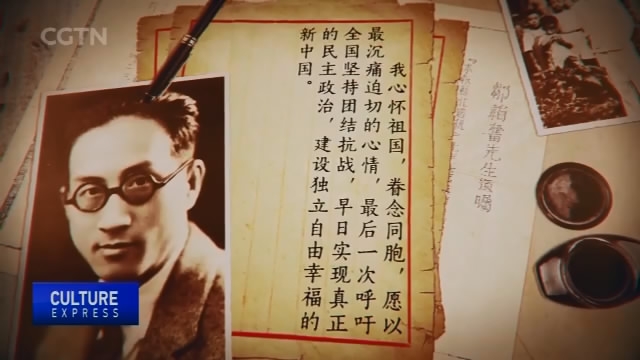
20:29, 24-Apr-2018
Founder of Sanlian Bookstore: Zou Taofen commemorated as nation's martyr
04:29

Zou Taofen didn't have weapons, but he still proved himself to be a soldier loyal to his home country. In wartime, he fought with his pen. Zou was a famous editor, reporter, publisher and political commentator in modern China.
Zou Taofen is the only member from the press and publishing industry on the list of martyrs commemorated on China's National Memorial Day, enacted since 2014. Zou fought with his pen against Japanese aggression until his death in 1944.
Zou called for all citizens to fight for China in an essay entitled "The responsibilities of the Chinese". He praised soldiers for "shedding blood on the battle fronts" in their efforts to preserve China's "thousands of years of civilization". He encouraged all to fight for "the peace and safety of the world."
In the eyes of Zou's daughter, her father seemed to spend his life writing in the interests of the people and the country.
Zou Jiali is now eighty-eight years old, and also worked in publishing before she retired. Since the 1980s, she has been collecting and compiling the posthumous work of her father.
ZOU JIALI DAUGHTER OF ZOU TAOFEN "To me, the biggest message from my father's essays is you live to stand, not live kneeling down. My father is a fighter. He had his faith."
Back in 1926, Zou Taofen became editor-in-chief of the magazine "Life". While the magazine continued to focus on social issues and problems, Zou added a "Reader's Mailbox" column. This section tried to help readers solve various problems from their lives, study, careers and marriages.
On September 18th, 1931, Japanese troops blew up a section of railway near the city of Shenyang, which triggered a large-scale armed invasion of northeast China. Zou used the "Life" magazine to call on youngsters to fight against the invasion. He also established a bookstore in Shanghai, to promote enlightened thoughts in those dark years. The bookstore branched out to other cities like Chongqing and Guilin, and developed into a famous chain, the SDX joint publishing company. It's now better known as the Sanlian bookstore, with its Beijing branch being a top destination for all culture lovers.
LU YINGYONG, DIRECTOR SANLIAN BOOKSTORE "Zou's opinion and vision struck a chord with all those enlightened youngsters. A lot of them chose a revolutionary path, and went to the anti-Japanese front, after being influenced by the books and magazines promoted by the bookstore."
From "Life" magazine to the Anti-Japanese aggression Journal that was released every three days, Zou never stopped calling on people to fight for China's sovereignty, even during his time in prison. He was one of the 'Seven Gentlemen' jailed by the Kuomintang in 1936, during China's civil war. The seven had denounced Kuomintang's inaction against Japanese aggression. Following pressure from society, the prisoners were released after Japan invaded China.
Graduated from St. John's University in Shanghai, Zou belonged to the first batch of Chinese intellectuals after 1919's May Fourth movement, which encouraged Chinese nationalism. But Zou didn't get to see the founding of the new nation. He died of brain cancer in July, 1944, about a year before Japan's surrender. Even after being diagnosed with cancer, Zou still managed to write more than 50-thousand words.
Although Zou has long passed away, his spirit is still carried on by the chain bookstore Sanlian. His tomb is at the Longhua Martyr Memorial Park in Shanghai. And he will be forever commemorated by his nation and his people.

SITEMAP
Copyright © 2018 CGTN. Beijing ICP prepared NO.16065310-3
Copyright © 2018 CGTN. Beijing ICP prepared NO.16065310-3